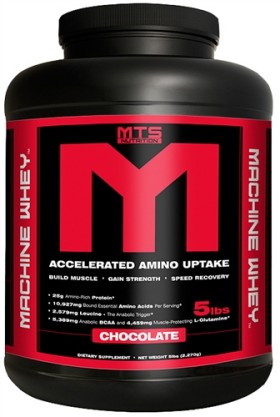When it comes to building muscle we all know that proper protein intake is vitally important. We learn this fundamental pillar of bodybuilding success early on. Protein is arguably the most vital macronutrient we need to
help build quality muscle.
However, few people take the time to dive into the variations of different protein sources. They never take the time to discover which protein foods yield the highest potential increases in strength and hypertrophy gains.
The quality of protein sources, and how the body consumes different types of protein foods, goes a long way in determining the overall bodybuilding benefits received. There are various indicators and quantitative assessments used to determine overall protein quality but the two most common are the
Biological Value (BV) and the
Protein Digestibility Corrected Amino Acid Score (PDCAAS).
let's take a look at some of the protein foods you commonly consume on a daily basis.
High Quality Protein Foods - Biological Value and PDCAA Score
Biological Value (BV) of Common Protein Foods
The biological value is a score given to various protein foods. It provides a rating between 0 and 100, assessing whether the protein source contains the essential amino acids required in proportion to the amounts required by the body.
In short, the biological value of protein represents how well protein and individual amino acids are absorbed by the body. Why is this important do you ask?
Amino acids that are not used by the body are excreted. Therefore, by consuming poor quality protein foods with a lower biological value, you may not be getting the most bang for your buck. Some of the amino acids are not being absorbed by your body. They are going directly to your toilet and not to the muscles.
[caption id="attachment_11880" align="alignright" width="280"]

MTS Machine whey is the highest quality, and comes in 12 amazing flavors.
order now.[/caption]
Without diving too far into the calculations behind the biological value of protein, let's take at some of the values present in popular foods:
-
Whey Protein 104-159
- Whole Egg 100
- Milk 91
- Egg White 88
- Cottage Cheese 84
- Tuna 83
- Fish 82
- Beef 80
- Chicken 79
- Casein 71
Now you may be asking yourself, are the differences between the various sources so immense that it will result in any increased absorption to the body thereby resulting in increased muscle gains? It is difficult to say with certainty, however, we can clearly see that whey protein has the highest biological value.
This is one of the main reasons why so many bodybuilders rely on whey protein post-workout. It has such a fast absorption rate, making it ideal for the so-called ?anabolic window.?
Eggs are also highly ranked in terms of overall biological value. Now I'm not saying you should switch solely to whole eggs for the main source of protein in your diet, however, it couldn?t hurt to throw some in for breakfast every now and again (if you don't already).
Protein Digestibility Corrected Amino Acid Score (PDCAAS)
The
Protein Digestibility Corrected Amino Acid Score (PDCAAS) has been adopted by various organizations as the preferred method for measuring the quality of protein as part of human nutrition. This method compares the concentration of the first limiting essential amino acid in the test protein with the concentration of that amino acid in a scoring pattern.
In other words, it is a measure of the protein?s ability to provide adequate levels of essential amino acids for human needs.
The PDCAAS is thought by many to be the most reliable tool available for analyzing protein quality. The values assigned to various food items are on a scale of 0.0 to 1.00.
The following is a list of PDCAAS scores for some common protein food items:
- Whey Concentrate and Isolates 1.00
- Whole Egg 1.00
- Milk 1.00
- Egg White 1.00
- Cottage Cheese 1.00
- Beef 0.92
- Chicken (unknown)
- Peanuts 0.52

Marc Lobliner drinking MTS Machine whey. Because having the highest quality whey protein on the market... That's not a game!
The PDCAAS clearly has some limitations. There are no results available for some common protein sources such as chicken, fish, and turkey. However, once again we can see that at the top of the list is whey protein.
The variability is not as great for this particular calculation and the differences are somewhat negligible, but any small difference over time could result in a much larger net positive effect.
Conclusion
The studies reviewed for the
Biological Value (BV) and the
Protein Digestibility Corrected Amino Acid Score (PDCAAS) do not provide data regarding the impact on muscle growth. It appears that it would be difficult to ascertain the effects of various protein food sources.
Each individual may respond differently. However, it is safe to say that whey protein and eggs are near the top of the list when it comes to overall absorption rates and digestibility. I am not saying they are necessarily superior protein sources compared to staples such as chicken, fish, or beef, but it is beneficial to consume a wide array of foods high in protein in order to get the most potential benefits.
Further studies will likely need to be completed to provide a more complete analytical result. Whey protein (although sometimes the subject of debate) is, in fact, a whole food that is easily absorbed and digested by the body. It should not be excluded from your overall diet.
As the phrase commonly goes, ?Variety is the spice of life.? This sentiment rings just as true when it comes to your protein sources and your diet as a whole.
References
"The Protein Digestibility?Corrected Amino Acid Score." Journal of Nutrition. N.p., n.d. Web. 4 Sept. 2015."The Protein Digestibility-corrected Amino Acid Score. - PubMed - NCBI." National Center for Biotechnology Information. N.p., n.d. Web. 4 Sept. 2015."Advantages and Limitations of the Protein Digestibility-corrected Amino Acid Score (PDCAAS) As a Method for Evaluating Protein Quality in Human Diets. - PubMed - NCBI." National Center for Biotechnology Information. N.p., n.d. Web. 4 Sept. 2015."Protein Digestibility-Corrected Amino Acid Scores (PDCAAS) for Soy Protein Isolates and Concentrate: Criteria for Evaluation - Journal of Agricultural and Food Chemistry (ACS Publications)." ACS Publications Home Page. N.p., n.d. Web. 4 Sept. 2015.

 MTS Machine whey is the highest quality, and comes in 12 amazing flavors. order now.[/caption]
MTS Machine whey is the highest quality, and comes in 12 amazing flavors. order now.[/caption]